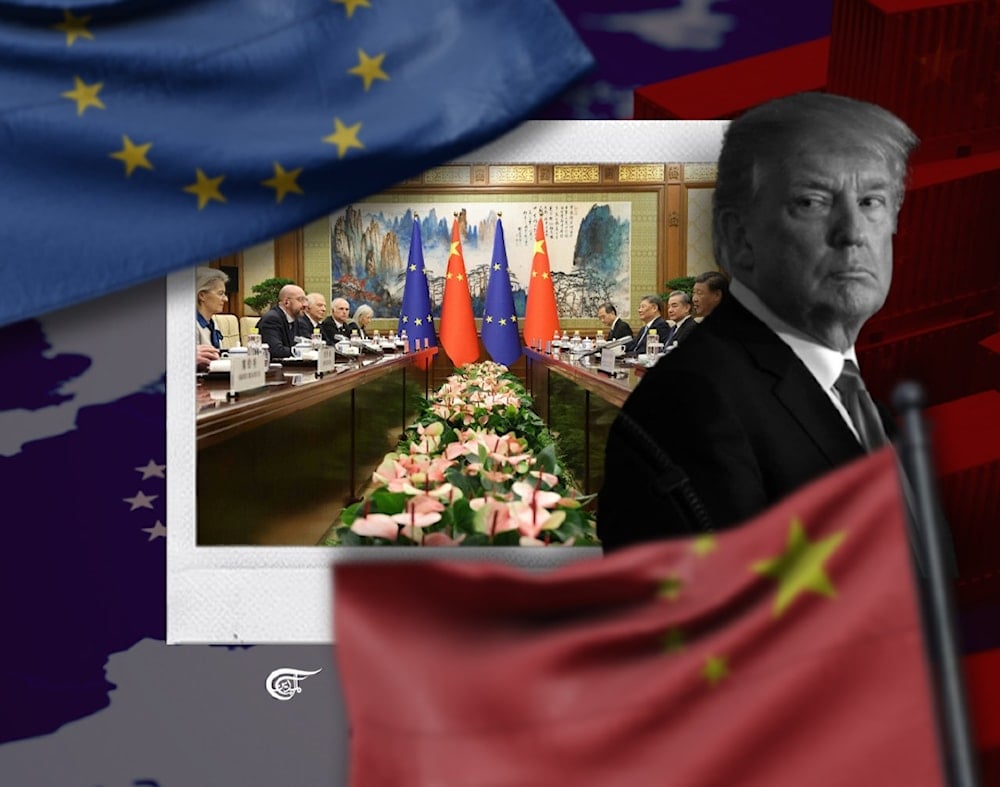Marking 50 years of China-EU diplomacy matters
Forging closer ties with China doesn’t mean that the EU must distance itself from the US; rather, it means Brussels will have stronger leverage in its negotiations with Washington.
-

Upcoming Beijing-Brussels summit in China marks 50 years of diplomacy (Illustrated by Zeinab al-Hajj for Al Mayadeen English)
An upcoming Beijing-Brussels summit in China aimed at marking 50 years of diplomacy between the two sides is a good opportunity to constructively recalibrate this relationship. In the words of Chinese Foreign Minister Wang Yi, China-EU cooperation has a strategic value. Faced with Washington’s unpredictability, China and the European Union have a common obligation to safeguard multilateralism and global stability. A stronger partnership between them is helpful in fulfilling that obligation.
On the part of China, its move to establish diplomatic ties with the European Community, the precursor to the EU, in 1975 was part of a broader strategy at the time to normalize relations with the West and break its international isolation. For Brussels, the decision was driven in part by a desire to seek new markets and diversify Europe’s trade. In retrospect, pragmatism was a key spirit of that step. As the world was in the Cold War, a lot of ideological pressure had to be overcome, and the two sides’ pragmatism was best rewarded by their swiftly expanding trade and investment relationship. 50 years on, pragmatism should continue to dominate China-EU relations.
Deepening trade and investment ties is one of the best ways to mark this milestone. Undeniably, both sides have benefited tremendously from the growth of their economic links. Businesses from Europe played a key role in propelling China’s reform and opening. In one example, the ability of a Chinese family to afford a Volkswagen Santana sedan in the 1990s was seen as a significant symbol of improvement in its living standard. In the present day, China has every reason to continue to welcome investment from Europe as part of the country’s efforts to pursue high-quality development. For European companies, the Chinese market is exactly what they need at a time of stagnant growth at home and an increasingly prohibitive American market.
Compared to decades ago, China is no longer a pure recipient of foreign investment. The country has come to a stage where it has competitive advantages in certain industries. If the EU finds it difficult to adapt to this new reality, problems will arise in its economic relations with China. In this regard, one example is Brussels’ tariffs on Chinese-made electric vehicles and its relevant complaints about China’s industrial policies. But somewhat counterintuitively, such frictions are a reflection of the expanding economic ties between the two sides. They are a natural outcome, rather than anything worrisome. Any attempt to fix the frictions by seeking to reduce connections is, in essence, chasing after small gains at the cost of bigger benefits.
Together, China and the EU account for more than a third of the world economy today. Against the backdrop of Washington’s protectionist trade policy, it is reassuring that both China and the EU have positioned themselves as steadfast supporters of free trade and globalization. This is perhaps why the rest of the world is, in the meantime, closely watching whether the two powers can resolve their own trade disputes in ways consistent with the spirits they endorse. There seems to be plenty of maturity in the two sides’ recent dialogues and consultations. On the part of Brussels, there has been a shift from talking about de-risking from China to speaking about engaging constructively with Beijing. At the forthcoming leaders’ summit, the two sides are expected to send a stronger signal that they need each other for trade and that they are jointly setting an example in opposing unilateralism.
With Donald Trump once again in the White House, Europe is arguably faced with an unprecedented crisis in its transatlantic alliance with the US. French President Emmanuel Macron has warned his fellow Europeans against thinking that the unthinkable cannot happen. Therefore, it’s not surprising that voices calling for European strategic autonomy appear to be louder than ever. In fact, strengthening its partnership with China can help the EU enhance the strategic autonomy it yearns for. Forging closer ties with China doesn’t mean that the EU must distance itself from the US. Rather, it means Brussels will have stronger leverage in its negotiations with Washington.
While the Trump administration’s policies and worldviews are a key factor that pushes the EU and China to work closer with each other, the two sides also need to make sure that this strategic adjustment is more than just a contingency plan. During Trump’s first term in office, the transatlantic relationship also soured, and by the end of that period, the EU and China had managed to conclude the negotiations for a mutually beneficial bilateral investment agreement. Later on, however, the deal’s ratification stalled on the European side partly due to the pressure exerted by the Biden administration. Meanwhile, a China-EU squabble over human rights in Xinjiang also played a role. At the time, the EU seemed to be assuming that Trump would be gone forever, and that a strong US-Europe relationship would resume. It is under such a mindset that the EU put its investment deal with China on hold. A lesson must be learned from how the agreement stalled, and Brussels and Beijing should think about how to make their relationship more resilient. It is in neither side’s interests if their ties can be easily affected by a third party or ideological differences.
At the end of the day, China and the EU are strategic partners. This formal definition of ties has existed since 2003. Despite their differences, there is no geopolitical conflict between them. The milestone of 50 years of diplomacy is a valuable asset in bilateral relations. If anything, the past half a century has offered a piece of wisdom that the two sides should and can maintain a trustworthy partnership.

 Ding Heng
Ding Heng
 6 Min Read
6 Min Read











